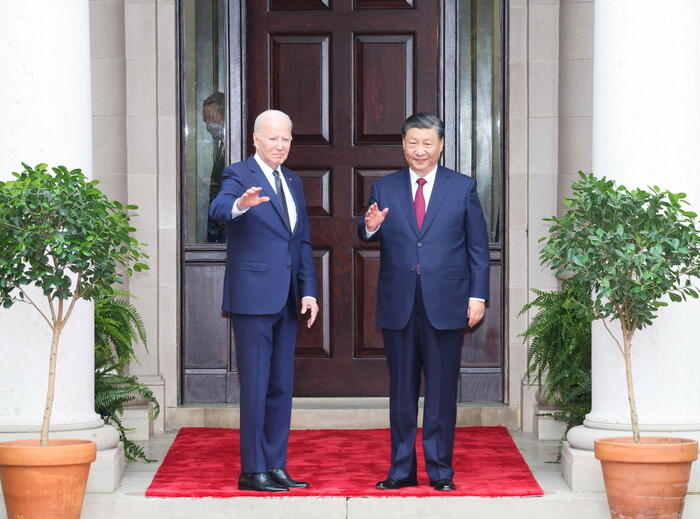Icon: enlarge
Global climate strike on September 20, 2020, here in New York: "Trump's reign was no progress for climate protection, but it wasn't a disaster either"
Photo: Rainmaker Photo / MediaPunch / Rainmaker Photo / MediaPunch / MediaPunch / IPx / AP
SPIEGEL
: Mr. Edenhofer, the likely new US President Joe Biden has made climate protection a political priority.
Can global warming still be stopped?
Edenhofer
: Biden is definitely a real new start.
How much it can really achieve is open.
Because the country is so divided, and if the Republicans continue to have a majority in the Senate, its political space is limited.
SPIEGEL
: Biden has promised to make the US climate neutral by 2050 and to spend billions on an energy transition.
Can he do it?
Edenhofer
: Whether he can implement the program in this way depends primarily on the majority in the Senate.
In any case, he can reform the rules for the electricity and energy sectors.
There are a number of extremely interesting opportunities that he should take advantage of.
SPIEGEL
: What could he do?
Edenhofer
: Trump had banned the responsible environmental authority from issuing requirements for CO2 emissions.
Biden could undo that.
Above all, it could ensure that the social costs of greenhouse gas emissions are better recorded.
That would make the climate-damaging coal electricity more expensive and could lead to a nationwide system of CO2 prices, as Europe is currently trying to develop further.
That would be a breakthrough.
SPIEGEL
: Under Trump, the United States neglected climate protection for four years.
Can that even be caught up?
Edenhofer
: Trump's reign was no progress for climate protection, but it wasn't a disaster either.
The CO2 emissions have even decreased because many coal-fired power plants in the USA have been taken off the grid simply because of the low gas prices.
At the same time, the share of wind and solar power has increased slightly.
Trump has talked a lot about the coal renaissance but, thankfully, made little difference in that regard.
"For example, Biden could target evangelical Christians."
SPIEGEL
: Just as little has changed in the major political influence of the oil and gas industry.
What can Biden do against their lobbying power?
Edenhofer
: Fortunately, there is more movement in the USA in this regard than is perceived in Europe.
Energy companies like Exxon are now speaking out in favor of CO2 prices!
A sun-rich oil state like Texas has recognized the opportunities renewable energies offer.
Many Republicans see this too. Biden would have to develop a narrative that would make his green agenda attractive to the other side of the political spectrum.
SPIEGEL
: What could that be?
Edenhofer
: For example, Biden could specifically address evangelical Christians.
There are many among them for whom the issue of "integrity of creation" is of great importance.
And when it comes to CO2 pricing, he could emphasize that this is a market-based tool, not an unpopular ban policy.
SPIEGEL
: Biden also wants to rejoin the Paris climate agreement, which Trump had canceled.
What would that do?
Edenhofer
: That's what Biden announced, and he can do that without any difficulty.
However, he would have to renegotiate the domestic political goals to which the US is committed to with the US Senate.
This is a hurdle that the new US president can overcome.
In any case, a US return to the Paris Agreement would send an important signal.
After all, China also wants to bring its CO2 emissions to zero by 2060.
If the US, China and Europe pull together on this issue, it would be historic.
Other regions of the world could hardly ignore it.
SPIEGEL
: But Biden is at least as critical of China's economic rise as Trump.
Won't that lead to new conflicts?
Edenhofer
: That is to be expected.
But it is also clear: if there is any field in which the three most important economic powers in the world will have common interests in the future, it is climate stabilization.
Europe in particular has an important role to play here.
SPIEGEL
: Which ones?
Edenhofer
: Europe would have to make suggestions for a system of CO2 prices that includes other regions of the world.
For example, some of the revenues from emissions trading could be used to persuade countries in Africa, Asia or Latin America to phase out coal.
"The coal question is the most important question in climate protection."
SPIEGEL
: A lot of money is currently being invested in new coal-fired power plants there.
How are you going to stop this trend?
Edenhofer
: The industrialized countries could offer the developing nations a deal according to the motto: You will receive grants for investments in renewable energies if you introduce CO2 prices in return.
The coal question is the most important question in climate protection.
It will be decided in the next five or six years.
If the USA, Europe and China went ahead here, an enormous amount would be gained for the climate.
SPIEGEL
: And then could the climate collapse still be prevented?
Edenhofer:
It can be done if everyone sets off - not at some point, but now.
In any case, the chances of this would be greater under a US President Biden than before.
Icon: The mirror







